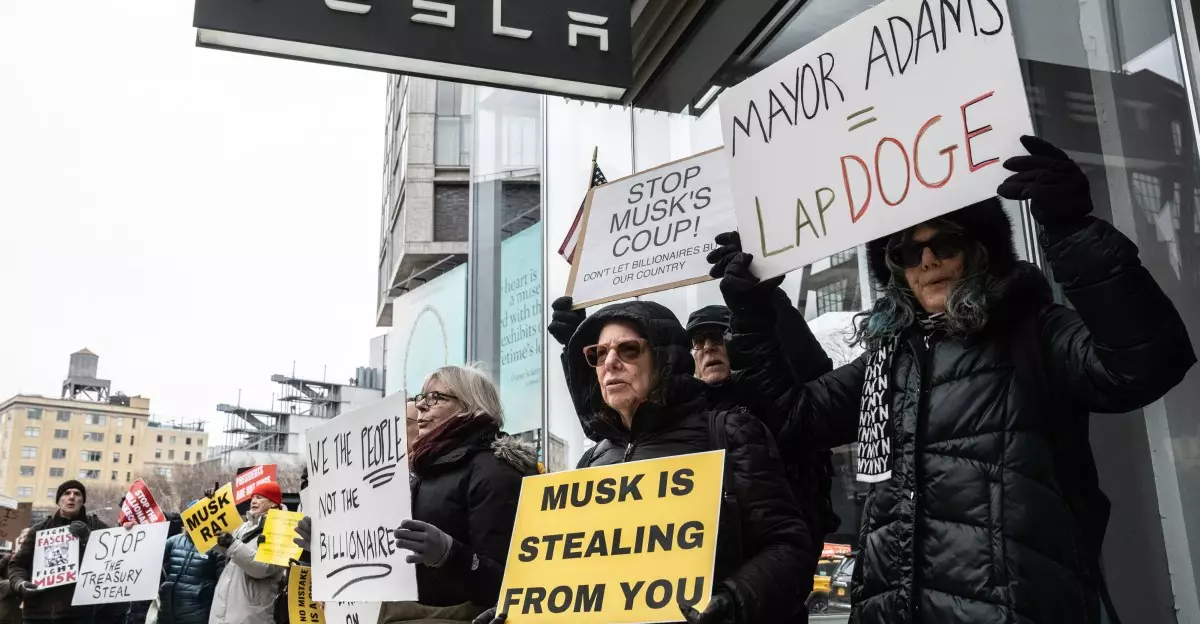This weekend witnessed a wave of protests across the United States, with demonstrators gathering outside Tesla showrooms to voice their discontent with CEO Elon Musk’s leadership and its repercussions on the automotive giant. The protests, part of a growing movement dubbed the #TeslaTakeover, reflected widespread concerns about Musk’s political affiliations and management practices. While the crowds at these demonstrations may not have been massive, they were dispersed across various cities, demonstrating a grassroots mobilization against a figure once heralded for revolutionizing the automotive industry.
Among the cities witnessing these protests were New York, Austin, and Seattle, highlighting the discontent extending from tech hubs to more suburban locales like Golden Valley, Minnesota. As Tesla positions itself as a leader in the electric vehicle market, the public’s distrust and dissent signal a significant shift that could impact the company’s image and operations. The protests, rooted in broader grievances against political polarization, showcased a unified front among disparate groups concerned about the influence of corporate leaders on democratic processes and societal values.
At the heart of the protests lies a critical perspective on Musk’s actions as the head of the Department of Government Efficiency during Donald Trump’s presidency. Protesters aimed their ire at Musk for his perceived complicity in divisive rhetoric and policies, leading to chants of slogans that condemned his alignment with far-right factions. Phrases such as “Don’t buy swasticars” suggest a potent sentiment against what many view as a dangerous blending of corporate interests and political extremism. These chants were emblematic of a broader rejection of Musk’s controversial comments and associations, which have raised eyebrows and turned heads both in and out of the automotive industry.
Frustrations have emerged not only among the public but also within Tesla itself. Recent meetings have revealed that employees and senior staff are increasingly vocal about their concerns, hinting at a desire for alternative leadership as they fear Musk’s various pursuits are detrimental to the company’s health. Reports from The Washington Post noted that some insiders believe the company would fare better if Musk stepped down—a stark indication of internal dissent that could jeopardize employee morale and performance.
Social media has played an integral role in shaping these protests, driving messages far beyond the traditional confines of public demonstrations. Activists utilized platforms like Twitter, along with the burgeoning Bluesky, to amplify their messages. The #TeslaTakeover hashtag has been a rallying point, cultivating a digital community centered around calls for accountability and ethical leadership at Tesla. While Twitter may not showcase the same volume of protest-related content, Bluesky and other platforms have birthed a collection of grassroots messages that resonate with a diverse audience.
High-profile figures have also lent their voices to the cause, including actor and activist Alex Winter, who encouraged protesters to divest from Tesla. Such support from influential individuals can lend credibility to public dissent and creates a ripple effect that may compel more consumers to reconsider their ties to the brand. Additionally, musician Sheryl Crow’s symbolic act of having a Tesla loaded onto a flatbed truck and her declaration of disassociation from the brand underscored the growing movement among high-profile critics.
As the protests continue to gain traction, more actions have been announced, with planned demonstrations scheduled for the upcoming President’s Day holiday. Cities such as Lowell, Maine, and Richmond, Virginia, are poised to witness rallies calling for ethical leadership and accountability within Tesla. The ongoing discontent with Musk and the broader implications of corporate influence on society indicate that this social movement is far from a fleeting moment.
Ultimately, the protests targeting Tesla serve as a reflection of increasing disillusionment with the intersection of technology, politics, and corporate governance. As the landscape of public opinion evolves, Tesla and its leadership will need to navigate these challenges, potentially reshaping how they engage with both consumers and the larger societal discourse. The coming weeks and months could prove critical for Tesla as it addresses not only the protests but the underlying issues of trust and accountability that have surfaced.

